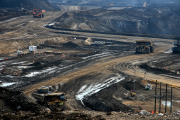Not long ago "environment" was another perfunctory tick-box. Just one of many items on the laundry list of things to which candidates for political office were expected to pay lip service.
No longer.
Public attitudes towards the environment have changed palpably and rapidly. Canada's record as one of the worst environmental performers in the world has taken its toll, and Canadians are telling anyone who will listen that fixing this disgraceful situation is a top concern.
One reason for this seismic shift in priorities is that the damaging effects of increasing pollution - unpredictable weather events, a degraded ecosystem, rising rates of illness like childhood asthma and cancer - are all around us. Despite this, governments of all stripes, at all levels, have been unwilling to address the problem. Because it is clearly affecting the health of our families and our quality of life, the environment has become a volatile "bread and butter" policy issue that politicians ignore at their peril.
Our elected leaders are now sitting up and paying attention. The next step is to ensure this translates into real action. 2007 must be the year to turn the tide on greenhouse gas emissions, smog and cancer-causing pollution. Excuses for inaction no longer cut it. Promises made but not kept don't cut it. Half-hearted, so-called solutions that won't get us where we need to go for another few decades don't cut it.
Timing is everything in politics. And now is the environment's time. Public concern has never been higher. Canada's economy is strong and ready to compete on global environmental performance. Everything is in place to quickly turn our country from being a global environmental laggard into a leader.
We will be expecting that all governments and political parties do their part, and our comments on their proposals will be guided by three principles:
- We're willing to work with anybody who is interested in making real progress. As Nicolas Sarkozy, the conservative candidate in the upcoming French presidential election recently said "Sustainable development and the defence of the environment is a question so fundamental that it can't be the property of one political party." Environmental progress is most rapid in those industrialized countries where a diversity of political parties embrace its central importance and compete to be its champion. This is our non-partisan goal for Canada.
- We're impressed with action, not promises. After years of broken promises in this area, enough is enough. If you're a politician looking for kind words from us about your latest platform, don't expect a warm welcome unless you have an accompanying rock-solid commitment to implement every word. If you fail to deliver, we will be merciless in our criticism.
- We need a hugely increased level of ambition. When thousands of Canadians are dying prematurely each year because of air pollution, and recent predictions by NASA indicate most ice in the Arctic will disappear in the next few decades, timid policy prescriptions are not going to get us where we need to go. Deep, mandatory cuts in greenhouse gases and air pollution are needed as soon as possible.
Our first priority in 2007 will be to work with the federal government and opposition parties to completely rework the proposed Clean Air Act. All parties have already signaled a willingness to work together, in an expedited way, to achieve this goal. We intend to hold them to this.
Canada must rejoin the international community and resume efforts to meet its binding commitments under the Kyoto Protocol.
And Canadians want, and expect, a federal action plan that contains regulated short and long-term targets and timelines for significant reductions in greenhouse gas and smog pollutants. A dramatically improved Clean Air Act, combined with strong federal regulations, is key to such a plan. Given the heightened public interest and parliamentary focus on this challenge, there is no reason a truly useful Clean Air Act can't be law within a few months.
Our joint New Year's resolution is to work tirelessly to ensure that 2007 is the year that begins a strong downward trend in air pollution and the emissions that cause global warming. The consequences of failure are too grim to contemplate: more asthmatic children, escalating cancer rates, thousands more Canadians dying of aggravated respiratory and cardiac conditions, and an increasingly destabilized climate threatening lives and our economy. Canada deserves much, much better. This time, Canadians will not permit our governments to let us down.
Bruce Cox is Executive Director of Greenpeace Canada, Stephen Hazell is Executive Director of Sierra Club of Canada, David Hocking is Acting Executive Director of the David Suzuki Foundation, Ken Ogilvie is Executive Director of Pollution Probe, Marlo Raynolds is Executive Director of the Pembina Institute, Sidney Ribaux is Executive Director of Equiterre, Mike Russill is CEO of World Wildlife Fund Canada, and Rick Smith is Executive Director of Environmental Defence.







